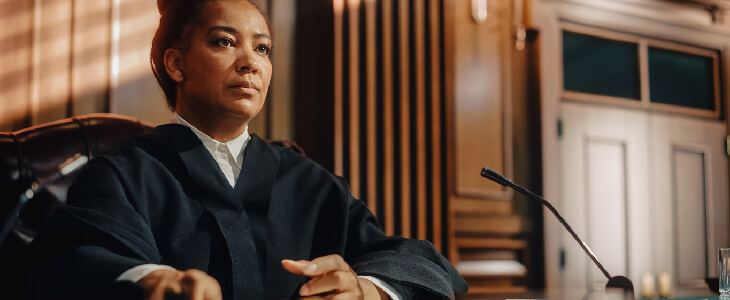When irregularities or errors occur at trial, a party who is unsatisfied with the ruling may have the right to appeal. Appellate law is a complex practice area that is subject to a number of rules, procedures, and deadlines which are vastly different from those existing at the trial level. If you disagreed with the outcome of your federal or state civil matter in Massachusetts, it’s time to explore your appellate options. Seder Law’s appeals attorneys are ready to get to work on your case today.
What Is an Appeal?
It is commonly believed that an appeal is simply another chance to re-try the original case. But this is not true. Simply losing a trial or disagreeing with the judge’s decision or the jury’s verdict does not provide sufficient grounds for a valid appeal. Rather, the objective of an appeal is to argue that there were problems with the way the trial was conducted that rendered an improper or unjust outcome.
To better understand what an appeal is, it helps to know common reasons to file one:
- Error of law: A judge makes an error of law when he or she applies the law incorrectly to the facts. This includes using the wrong rule or legal standard and usually happens because of a misunderstanding of a statute or case law. For example, in a child custody matter, the judge must make a decision based on the best interests of the child standard.
- Evidentiary issues: Judges are allowed a fair amount of discretion in deciding whether to admit or exclude evidence at trial. But this discretion is not unlimited because there are rules of evidence that must be followed. If the judge admitted or excluded evidence in a way that was unreasonable, erroneous, or not supported by the facts or law in the case, this could be grounds for an appeal.
- Jury misconduct: Jurors are subject to restrictions on their activities during trial and deliberations. Any sort of illegal or inappropriate conduct on their part may taint the court’s decision and open the door to an appeal. An example might be if a member of the jury discussed the case on social media or was influenced by something that occurred outside of the trial.
- Constitutional grounds: Some appeals are based on the claim that a party’s state or federal constitutional rights were violated. Although constitutional issues are more likely to be raised in a criminal trial, they can also exist in civil cases. For example, a civil litigant has the right to demand a jury trial pursuant to Massachusetts statute. Refusal to grant this may be a violation of a party’s state constitutional rights.
What Are the Steps in an Appeal?
Several intricate steps must be followed to properly appeal one’s civil case. There are slight differences between the Massachusetts and federal appeals systems, but many of the same requirements are shared by both. What follows is a broad overview of what the party wishing to appeal (the appellant) must do:
- File the notice of appeal: Within 30 days of the trial court’s decision, the dissatisfied party must file and serve a notice of appeal. This document informs the trial court and the other parties to the case of the intent to appeal. However, it should be noted that this is not the appeal itself.
- Prepare the record on appeal: The appellate judges who will review your case were not present at the original trial. Therefore, they need some way to understand what happened so they can determine whether an error was made that justifies the appeal. Your appellate lawyer will work to prepare the record on appeal by ordering transcripts and copies of trial court records.
- File the appellate brief: The appealing party will file a brief which makes legal arguments in reference to the record on appeal. This document is the best chance to make the case for overturning the trial court’s decision. The non-appealing party (appellee) also has the right to file a responsive brief.
- Oral argument or submission on briefs: In Massachusetts appeals, the parties can agree to have the matter decided on the briefs. However, the court may ask the parties to make oral arguments which can clarify points raised in the briefs. A party may waive their right to oral argument. For federal appeals, the court may schedule oral arguments to better understand the parties’ respective arguments. Oral arguments are optional and are subject to the court’s discretion.
Possible Outcomes of Your Appeal
There are generally three ways an appellate court will decide an appeal:
- Affirm the trial court’s decision, allowing the verdict or judgment to stand
- Reverse the trial court’s decision, and possibly order a new trial
- Remand the case back to the trial court for further proceedings
Your appellate attorney will work for the best possible outcome to protect your legal rights and interests.
Types of Appeals We Handle
We represent individuals, businesses, and organizations on both sides of state and federal appeals in a wide range of cases, including:
- Bankruptcy
- Employment law
- Real estate and land use
- Intellectual property law
- Health care
- Family law
- Business and corporate law
- Securities
- Administrative law
Contact Our Worcester Appeals Attorney
Appellate law is subject to complicated rules, procedures, requirements, and deadlines. Failing to abide by any of these could jeopardize your appeal, but Seder Law is experienced with both state and federal appellate matters. We can handle each step of your case, from filing the notice of appeal to making oral arguments and submitting the matter to the judges.
To learn more about our appellate practice group or to get started on your appeal, give Seder Law a call today.










